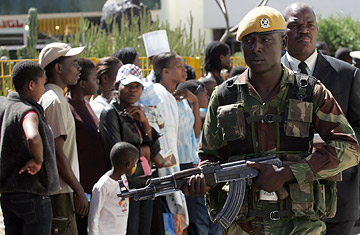
A Zimbabwean soldier secures the area as Zimbabwe President Robert Mugabe tours the Zimbabwe International Trade Fair in Bulawayo.
Shaken by the rebuke he suffered at the hands of Zimbabwe's voters on March 29, President Robert Mugabe was widely rumored to be considering stepping down. But then, say many analysts and diplomats, a powerful cadre of generals determined to preserve their own grip on power through a sweeping campaign of terror stepped up — and supposedly convinced their faltering leader to stay on. On Tuesday, the charge that a military junta has effectively supplanted Mugabe was repeated by opposition leader Morgan Tsvangirai, who claims to have won an outright victory on March 29, despite the determination by the Zimbabwe Electoral Commission that a runoff race is needed. The security forces, says Tsvangirai, leader of the Movement for Democratic Change (MDC), are determined to hang on to power through violence, regardless of the preference of the electorate in the runoff vote scheduled for June 27.
"This country is now effectively run by a military junta," Tsvangirai told reporters in Harare. "As a people, we have been exposed to state-sponsored brutality." Similar claims were made in a report issued Monday by Human Rights Watch, which blames a secretive body of military and police commanders known as the Joint Operations Command (JOC) for orchestrating the political violence that has rocked the country since the March election. The MDC claims that 66 of its supporters have been killed and thousands more beaten, tortured, wrongfully arrested and forced from their homes.
The army that the MDC alleges is now in charge in Zimbabwe has made clear that it will not accept the MDC in government. After the election, Army Chief of Staff General Constantine Chiwenga told the Zimbabwe Standard that "the army would not support or salute sellouts and agents of the West" — a clear reference to the MDC. "We are talking about the chairperson of the Zimbabwe Electoral Commission, who is a colonel," MDC spokesman Nelson Chamisa told TIME. "If you look at all the key institutions, the army is calling the shots. Even the Mugabe campaign is being carried out by the army. Everywhere in the country, you meet soldiers and people who are armed."
In light of the tactics being used to keep him out of power, Tsvangirai hesitated before returning to Zimbabwe from South Africa to contest the runoff, which was declared when the Electoral Commission ruled that, although Tsvangirai won more votes than Mugabe, his tally did not pass the 50% mark. Since returning home, Tsvangirai has been detained twice while campaigning; his party's rallies have been banned; and, he alleges, police have impounded his armored BMW X5, which he claims is now being used by Mugabe's Zanu-PF officials for their own electioneering. But had Tsvangirai stayed away, Zimbabwe's electoral law says, Mugabe would have remained President by default.
Still, it's far from clear that the MDC has even the faintest hope of winning an election in which its supporters are being cowed by violence directed at keeping them away from the polls, and which it believes is likely to be rigged by the military. "We can see the army's control over the entire electoral process in Zimbabwe and its willingness to resort to violence," Human Rights Watch Zimbabwe expert Tiseke Kasambala told TIME. "We believe that the elections shouldn't be taking place under current circumstances."
And the repression seems to grow increasingly brazen. Last week, the Zimbabwe government barred humanitarian aid groups from working in the country, putting some 2 million people who rely on food aid in jeopardy. It also arrested British and American diplomats investigating the human-rights abuses. "This is a military coup by stealth," an unnamed diplomat told the Times of London. "There are no tanks on people's lawns, but the Joint Operations Command runs this country."
Without Mugabe in power, Kasambala and other sources say, powerful figures like Minister of Rural Housing Emmerson Mnangagwa, who is reportedly in charge of the JOC, as well as others such as General Chiwenga and Air Force Commander Perence Shiri, fear war-crimes prosecution for their roles in a campaign of violence in the early 1980s, during which thousands of ethnic Ndebele were killed. "What is at stake for the Zimbabwean military generals is being brought to justice for more than 20 years of human-rights abuses," researcher George Katito of the South African Institute for International Affairs told TIME.
Many of the same figures have also reportedly benefited from the seizures of white farms authorized by Mugabe, and have grown rich from an entrenched system of political patronage and corruption. "A lot of them have dirty hands," says Kasambala. "They've enriched themselves and want to hang on to what they have and avoid charges of corruption." But unlike those who believe that Mugabe's power has been eclipsed by his generals, Kasambala says that both are behind the current atrocities. "To talk about a coup is almost to take the responsibility from Robert Mugabe for the abuses that are taking place," she says. "I don't think he's a puppet of the generals. When he was leading in 2002 and in the 1980s, the intimidation strategies were the same."
